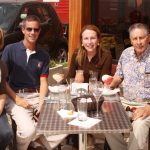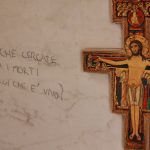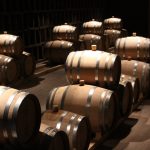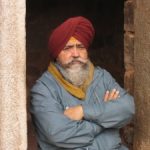I have been fortunate to track down some of my father’s heritage – from Luxembourg to Los Angeles. Now it was turn for my mother’s side of the family. They come from a very beautiful part of Italy – in the hills along the Italian Riviera.
We visited the small town of Casarza Ligure; the “Gallo” name is everywhere which is my mother’s maiden name. The homesite of my great Grandfather, Guiseppe Gallo is situated high on a hill above Casarza and the busy highway below; Giuseppe was born in this home. He left Casarza at age 18, signed in at Ellis Island in New York and never returned to Italy. It was with great disappointment and sadness that his home was torn down 2 or 3 years ago and in its footprint sits a brand new apartment building.
The ancient olive trees that conceivably he or his father helped plant are rooted deeply in the steep hillsides. From this site one has a great view of Casarza far below, the Mediterranean Sea off in the distance and directly below, the busy highway which shoots through the mountains one tunnel at a time. When he lived here it probably would have been nearly quiet except for natural sounds; today it is a very noisy perch because of the highway.
- Hanging out with relatives
- New apartment building on Great Grandfather’s homesite
- View from Great Grandfather’s homesite
- Church tower in Casarza
We visited the town cemetery – the Gallo crypt had been rebuilt in the last year after one of our relatives tragically died at a young age from a motorcycle accident. He wrote the following in Italian on his wall the night before he died: “Perche cercate tra i morte colui che e vivo?” or translated into English: “Do not look among the dead for one who is living”.
A garden sits next to the cemetery – an old farmer welcomed us in to look around. He knew one of our relatives who died 10 years ago – a priest who was instrumental in building our family tree with names of relatives that date back to the Renaissance period.
This part of Italy is so little visited by non European tourists compared to nearby Cinque Terre and other parts of the Italian Riviera. This is refreshing especially when you head for the hills above town and find small little inhabited villages – some just containing a handful of homes. Narrow roads wind their way between ancient homes. One such place is Varese Ligure – a medieval city full of “Figone’s” the maiden name of my grandmother. Her family was from this tiny town. The bridge built in the 1500’s is one of the highlights of a visit here. It was built after a young lover died trying to reach his wife, crossing a foot bridge over the swollen river.
Now we are staying at a beautiful old hotel, Hotel Amici – run by the mayor of the town. There are no tourists here, the hotel is empty except for us and we spend the evenings languidly lounging around one enjoying Italian wine at any of the several cafes located on the main plaza.
- Cemetary in Casarza
- Gallo Family
- Words inscribed in marble
- Medieval bridge in Varese Ligure















Thank you for this touching story. I hope this place will stay out of mass tourism path, welcoming just those visitors who are looking for real emotion and real life.
This is a lovely post. And I think the fact that you are hunting for your heritage is admirable and undoubtedly makes for some emotional times!
I am just having some trouble with the quote from your relative who died in the motorcycle accident – your translation into English makes sense and is very poetic, but the original Italian does not. is that really what he wrote? Because even accounting for typos, the translation would be “why do you look among dead dogs who is alive”.
I don’t mean to spoil the mood or anything, I just thought I’d bring it to your attention, since you no doubt wanted to be genuine when including the original Italian! It’s like having spinach in your teeth – as uncomfortable as it may be when someone points it to you, it gives you a chance to fix it and save some embarrassment
Elisa – thanks very much for pointing that out. Not at all what i wanted to translate from
Enlisting the help of my brother I have just fixed:
Perche cercate tra I morte colui che e vivo?
You can see the picture in this post of the inscription also.
Thanks again!